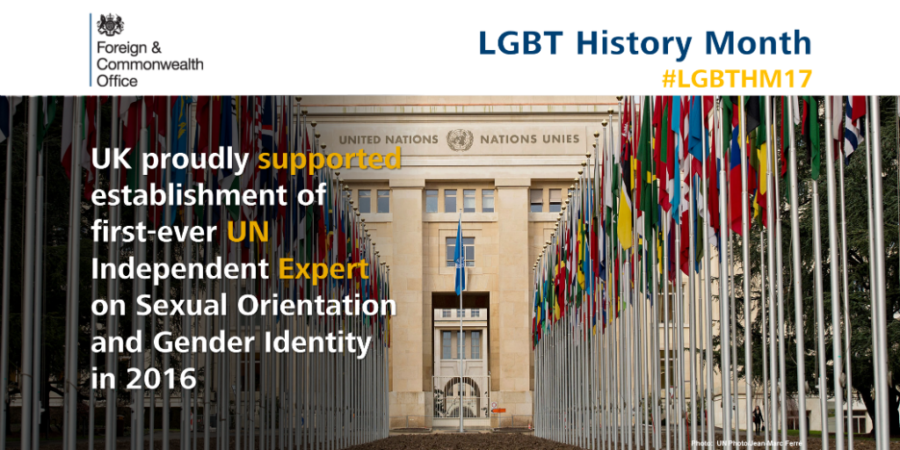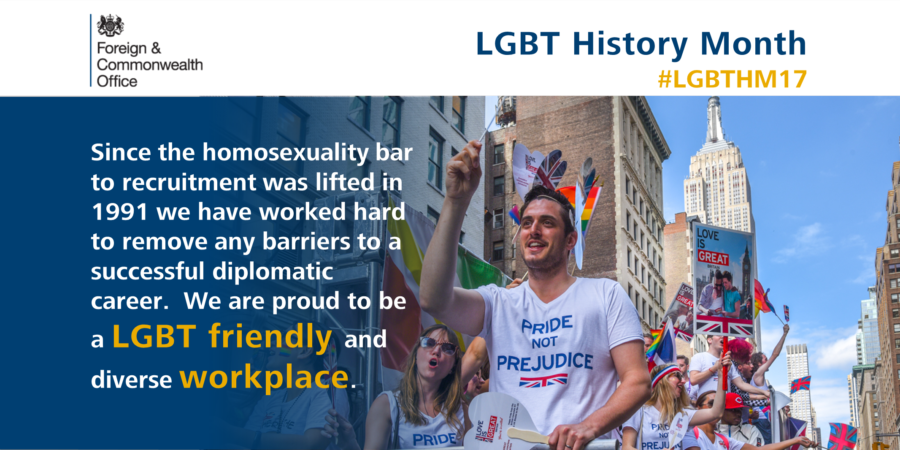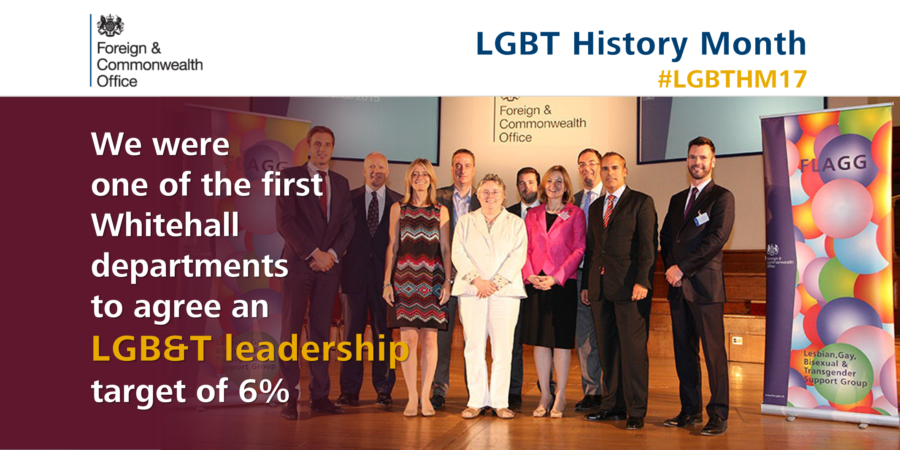10th February 2017 London, UK
LGBT History Month is…

Every February, UK celebrates LGBT History Month. For me, being part of a global network of LGBT and straight ally colleagues, I am amazed every month when I see a celebration of the FCO’s diversity & inclusiveness, and the pride that posts have in showcasing the UK’s commitment to LGBT rights around the world.
Yet February always remains a poignant month to reflect on the past, present and future of the LGBT community and the LGBT workforce. It is a month where slowly but surely the grass thaws, the dark nights get shorter and the days get brighter. And for me, LGBT History Month goes beyond whether I am gay – it is a symbol of reflecting on diversity and inclusion in general, on hope for a better tomorrow.
… a month to remember a sometimes/too often tragic past and recognise the progress made
A few months ago I was asked if there was a generational difference when it comes to LGBT issues. My answer was that today’s younger generations see LGBT people as part of everyday society – in television, sport, politics, society. Yet, as they see this as normal, they may forget the difficult and often tragic past that came before them.
For the UK, 2017 marks the 50th anniversary of the passing of the Sexual Offences Act 1967, partially decriminalising homosexual acts in England and Wales after centuries of persecution. The UK has come a long way in 50 years. Just last month we saw the passing of the Policing and Crime Bill. This, the ‘Alan Turing law’, enshrines in law pardons for those convicted of consensual same-sex relationships. Yes, there have been bumps and criticisms, but we have come so far. I for one am proud that all our UK Heads of Diplomatic Missions act as envoys to promote and protect LGBT rights, and champions for inclusion and diversity in their own posts and workplaces.
The Foreign & Commonwealth Office has also made progress, albeit in a shorter time – it was only in 1991 when the ban on gay diplomats was lifted. LGBT History Month is a chance to reflect and spare a thought for those former colleagues who were not able to take forward their FCO careers and for those whose current careers are still influenced by the ban and discrimination experienced.

… an opportunity to share what it means to be LGBT.
Since 1991, many FCO LGBT staff have slowly been able to share their experiences and their whole selves with the rest of the organisation. This was aided in 1998 when FLAGG was founded, the FCO staff network for LGBT staff – and not just for them, but for straight allies too. The power of allies has been a driving force in a lot of change that has occurred in a relatively short space of time. Through their support, hurdles have been removed so that LGBT staff have less and less barriers to a successful career in the FCO.
Over time, attitudes have changed. Policies and processes have changed. But most importantly, organisational cultures have changed. This has manifested in a number of ways: the open and constructive dialogue that we have as LGBT staff with senior management; the fact that we were one of the first government departments to establish an LGBT target for senior management staff; the support shown as we actively promote LGBT diversity and inclusion in the workplace.

… to pave a way for the LGBT colleagues, the LGBT leaders of the future
For any LGBT network in the UK – or even around the world – there are still battles to fight, and challenges to overcome. Regardless of what the future brings, organisations should still continue to strive for more inclusive workplaces, where LGBT staff can be authentic, bring their whole selves to work, and thrive in workplaces that accept them for who they are.
Thank you Will for a great piece. I have been with the organisation and I have to say that FLAGG should be congratulated on the work that they have done to increase awareness and understanding with respect Diversity and Inclusion.
I have applied to attend the Stonewall Allies Programme on March 29th 2017, as I want to do more to support FLAGG and its members and ensure that we have a working environment in which we are all treated with respect and equality.